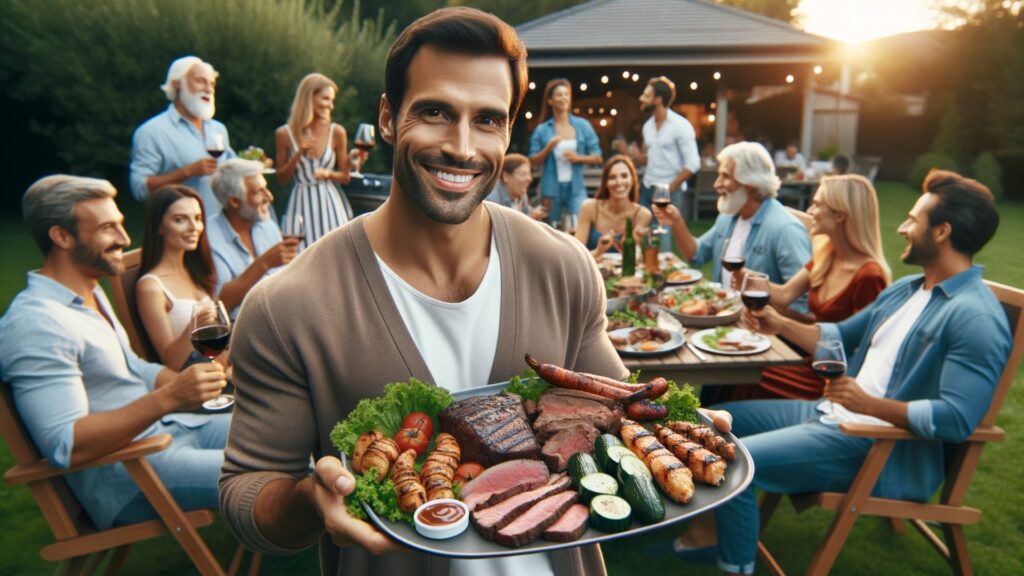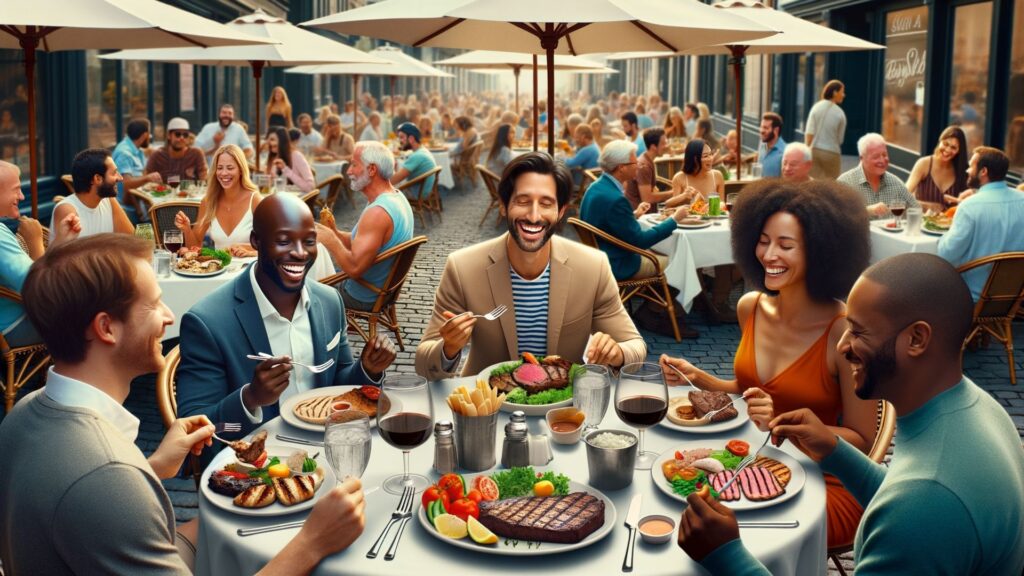Navigating Social Situations on the Carnivore Diet
Following a carnivore diet comes with its own set of challenges, especially when it comes to navigating social situations. Understanding the nuances of the carnivore diet is crucial in handling social events with confidence and ease. One of the biggest challenges of following a carnivore diet in social situations is the lack of variety in food options.
Many social events often revolve around carb-heavy or plant-based dishes, making it difficult for carnivores to find suitable options. It’s important to communicate your dietary restrictions to the host or restaurant ahead of time so they can accommodate your needs.
Another challenge is dealing with criticism or judgment from others who may not understand or agree with your dietary choices. It’s important to stay confident in your decision and educate others about the benefits of the carnivore diet if they express curiosity or concern.
To navigate social situations on a carnivore diet, it can be helpful to bring your own food or snacks to events to ensure you have something to eat. You can also try to focus on the social aspect of the event rather than the food, and prioritize spending time with friends or family over what you’re eating.
Overall, the key to navigating social situations on a carnivore diet is to be prepared, stay confident in your choices, and communicate your needs effectively. With a little planning and confidence, you can enjoy social events while staying true to your dietary preferences.

Understanding the Carnivore Diet
What is the carnivore diet?
The carnivore diet is a dietary choice that primarily consists of animal products while eliminating plant-based foods. Followers of this diet believe that by eating only animal-based products, they can reap numerous health benefits. This diet typically includes meats such as beef, chicken, fish, and pork, as well as animal-based products like eggs, dairy, and bone broth. The carnivore diet is often touted for its potential to aid in weight loss, regulate blood sugar levels, improve mental clarity, and reduce inflammation.
Advocates of the carnivore diet argue that humans have evolved to be efficient meat-eaters, pointing to our ancestors who primarily survived on hunting and consuming animal products. They believe that the high protein and fat content in animal-based foods provide essential nutrients and energy without the need for carbohydrates or plant-based sources.
However, critics of the carnivore diet raise concerns about potential nutritional deficiencies, particularly in essential vitamins and minerals that are primarily found in plant-based foods. They also point out the potential risks of consuming high levels of saturated fats and cholesterol from animal products, which have been linked to heart disease and other health issues.
Ultimately, the carnivore diet is a controversial dietary approach that may work well for some individuals but may not be suitable for everyone. It is important to consult with a healthcare professional or nutritionist before making significant changes to your diet to ensure that you are meeting your nutritional needs and maintaining overall health and wellbeing.

Benefits of following a carnivore diet
Proponents of the carnivore diet claim benefits such as improved mental clarity, weight loss, and reduced inflammation. Many individuals find the diet to be a transformative experience in terms of their overall well-being. However, critics argue that the carnivore diet is restrictive and lacks essential nutrients found in a balanced diet that includes fruits, vegetables, and other plant-based foods. They caution that long-term adherence to a carnivore diet may lead to nutrient deficiencies and potentially harmful effects on overall health.
It is important for individuals considering the carnivore diet to consult with a healthcare provider or registered dietitian to ensure they are meeting their nutritional needs and to monitor their health while on the diet. Ultimately, the best diet is one that is sustainable, balanced, and tailored to an individual’s unique needs and preferences.
Dietary restrictions on a carnivore diet
Those who follow the carnivore diet need to strictly adhere to consuming only animal products. This restriction can make social interactions challenging, as many social gatherings revolve around non-carnivore food options. To navigate social situations while following a carnivore diet, it’s important to communicate your dietary restrictions to friends and family in advance. This will allow them to plan meals that are suitable for your diet or give you the opportunity to bring your own food. It’s also helpful to suggest restaurants or venues that offer meat-heavy options to ensure you have something to eat.
Additionally, being prepared with snacks or meal alternatives can help you avoid feeling left out or hungry during social gatherings. Packing some jerky, hard-boiled eggs, or cheese can be a convenient way to ensure you have something to eat in case there are limited carnivore-friendly options available.
Finally, remember to focus on the social aspect of the gathering rather than solely on the food. Engaging in conversation, playing games, or participating in activities can help shift the focus away from food and allow you to enjoy the company of others.
Overall, with some planning and communication, it’s possible to maintain a carnivore diet while still participating in social events and gatherings.
Handling Social Events on a Carnivore Diet
Strategies for navigating social gatherings
When attending social events, it’s essential to have a plan in place to handle the dietary choices offered. Bringing carnivore-friendly dishes or snacks to share can ensure you have options available to consume while socializing.
Here are some tips to help you navigate social events as a carnivore:
1. Plan ahead: Before attending an event, check with the host to see what will be served. If there are limited options for carnivores, consider bringing your own dishes to share.
2. Focus on protein: Look for meat-based dishes like grilled chicken, steak, or seafood. Avoid dishes that are heavily processed or have added fillers.
3. Skip the sides: Many side dishes at social events are carb-heavy, so focus on the protein options instead. If you do want a side dish, opt for non-starchy vegetables or a simple salad.
4. Stay hydrated: Make sure to drink plenty of water throughout the event to stay hydrated and help with digestion.
5. Be prepared to explain your dietary choices: Some people may not understand your preference for a carnivore diet. Be prepared to explain your reasons and politely decline any alternative suggestions.
6. Don’t stress: Remember that it’s okay to enjoy yourself at social events. If there are limited options for carnivores, focus on enjoying the company of others and don’t stress too much about the food.
By planning ahead and being prepared, you can enjoy social events while sticking to your carnivore diet. Bring your own dishes to share, focus on protein options, and don’t stress too much about the food. Enjoy the company of others and have a great time!
Dealing with social settings while following a carnivore diet
Communicating your dietary needs clearly and confidently to hosts or organizers of social events can help in ensuring there are suitable options for you. It’s also helpful to educate others about the reasons behind your dietary choice.
When discussing your dietary needs with a host or event organizer, it’s important to be clear about your restrictions or preferences. For example, if you are vegan, gluten-free, or have a food allergy, make sure to clearly state what your dietary requirements are. This will help the host know what options to provide for you.
In addition to being clear about your dietary needs, it’s also helpful to explain the reasons behind your choice. For example, if you are a vegetarian for ethical reasons or have a gluten intolerance, sharing this information can help others understand and respect your dietary choices.
By confidently communicating your dietary needs and educating others about the reasons behind them, you can help ensure that there will be suitable options for you at social events. This can help you feel more comfortable and enjoy the gathering without worrying about whether there will be food that meets your needs. So don’t be afraid to speak up and advocate for yourself – your health and well-being are important!
Educating others about the carnivore diet during social events
Take the opportunity during social events to educate others about the carnivore diet. By sharing your experiences and knowledge, you may help others understand and respect your dietary preferences.
When at social events, it’s important to be respectful of others’ dietary choices and not to come off as preachy or judgmental. However, if someone asks about your diet or expresses curiosity, take the opportunity to share information about the carnivore diet. You can explain the benefits you have experienced, such as improved energy levels, weight loss, and better mental clarity.
You can also address common misconceptions about the carnivore diet, such as concerns about nutrient deficiencies or the impact on the environment. By providing accurate information and sharing your personal experience, you can help others understand the reasons behind your dietary choices.
It’s also a good idea to offer to answer any questions or provide resources for those who are interested in learning more about the carnivore diet. By engaging in open and respectful conversations, you can help educate others about the potential benefits of this eating approach.
Challenges Faced in Social Gatherings
Effectively communicate dietary needs at social events
Clearly communicating your dietary needs at social gatherings is essential. Politely informing hosts or friends about your dietary restrictions can help in ensuring there are suitable options available for you.
Some tips for effectively communicating your dietary needs at social gatherings include:
1. Be proactive: If you know in advance that you have dietary restrictions, reach out to the host or organizer to inform them of your needs. This gives them time to plan and make accommodations for you.
2. Be specific: Clearly communicate what you can and cannot eat. Provide examples of foods that are safe for you to consume and offer suggestions for alternative options if needed.
3. Offer to bring your own dish: If you are unsure if there will be suitable options for you, offer to bring a dish that fits within your dietary restrictions. This way, you can ensure that there will be at least one thing for you to eat.
4. Be polite and grateful: Remember that it is not the host’s responsibility to cater to your dietary needs, so be respectful and appreciative of any efforts made to accommodate you.
5. Educate others: Use this as an opportunity to educate your friends and family about your dietary needs. Explain why certain foods are off-limits for you and how they can help support you in making healthy choices.
By effectively communicating your dietary needs at social gatherings, you can ensure that you are able to enjoy the event without compromising your health. Thank you for taking the time to accommodate my dietary needs.
Dealing with non-carnivore options at social gatherings
When faced with non-carnivore options at social gatherings, focus on choosing the closest carnivore-friendly options available. Opt for dishes that align with your dietary requirements as closely as possible. This could include grilled chicken or steak skewers, plain hamburgers or hot dogs without buns, shrimp cocktail, or a salad with grilled chicken or salmon.
If none of these options are available, consider bringing your own dish or politely asking the host if they can accommodate your dietary needs. It’s important to communicate your dietary restrictions in advance to ensure there are options available for you to enjoy at the gathering. Remember, it’s okay to prioritize your health and well-being, even in social situations.
Coping with social pressure to deviate from the carnivore diet
Social pressure to deviate from the carnivore diet can be challenging. Stay committed to your dietary choice and politely decline offerings that do not align with your nutritional preferences.
Long-term Sustainability of the Carnivore Diet
How to adhere to the carnivore diet long-term in social situations
Long-term adherence to the carnivore diet requires planning and perseverance, especially in social settings. Seek out support systems and like-minded individuals to stay motivated on your dietary journey. There are several ways to ensure long-term adherence to the carnivore diet. One important aspect is planning your meals and ensuring you have a variety of meats and animal products available to meet your nutritional needs. It can also be helpful to have a list of go-to recipes and meal ideas to prevent boredom with your food choices.
In social settings, it can be helpful to communicate your dietary needs and preferences to friends and family so they can support you in your journey. This may involve bringing your own food to gatherings or choosing restaurants that have carnivore-friendly options. It’s also important to remember that it’s okay to politely decline food that doesn’t align with your dietary goals.
Finding a support system can also be beneficial for staying motivated on the carnivore diet. This may involve joining online communities or finding like-minded individuals who follow a similar way of eating. Connecting with others who understand your dietary choices can provide encouragement and inspiration on your journey.
It’s important to remember that sticking to the carnivore diet long-term may require perseverance and dedication, especially in a society that often revolves around food-centered social events. By planning ahead, seeking support, and staying committed to your goals, you can increase your chances of successfully adhering to the carnivore diet for the long haul.
Finding support systems for social dining on a carnivore diet
Building a supportive network of individuals who understand and respect your dietary choices can greatly enhance your social dining experiences. Share recipes and tips with others following a similar diet.
Some ways to build a supportive network include:
1. Joining online communities or social media groups focused on your dietary choices.
2. Attending local meet-ups or events for individuals following a similar diet.
3. Hosting potlucks or dinner parties with friends who also follow the same dietary restrictions.
4. Sharing recipes and tips with others, and being open to trying new dishes recommended by members of your network.
5. Being open and honest about your dietary needs, and asking for support when dining out or attending social events.
6. Encouraging others to try new foods and expand their culinary horizons within the constraints of your shared dietary choices.
7. Celebrating successes and offering support during challenges faced while sticking to your dietary restrictions.
By surrounding yourself with like-minded individuals who understand and respect your dietary choices, you can create a more inclusive and enjoyable social dining experience for yourself and others. Sharing recipes and tips with your network can also help you discover new ways to enjoy your favorite meals and stay motivated in maintaining a healthy and balanced diet.
Nurturing a positive mindset while navigating social settings on a carnivore diet
Maintaining a positive attitude and mindset when faced with social challenges on a carnivore diet is key to long-term success. Focus on the health benefits and improvements you’ve experienced since adopting the diet. Remind yourself of the reasons why you made the switch to a carnivore diet in the first place, whether it be weight loss, improved energy levels, better digestion, or overall health improvements.
Keep in mind that everyone’s journey is unique and what works for one person may not work for another.
When faced with social challenges, such as friends or family members questioning your dietary choices, stay calm and composed. Educate them on the benefits you’ve experienced and the reasons behind your decision. Remember that people may not understand or agree with your choices, and that’s okay. Stay true to yourself and your goals.
Surround yourself with a supportive community of like-minded individuals who can provide encouragement and advice. Join online forums, social media groups, or local meetups to connect with others following a carnivore diet. Having a support system can help you stay motivated and positive when faced with challenges.
Lastly, focus on the positive aspects of your carnivore diet journey. Celebrate your successes, whether they be improved health markers, increased energy, or better mental clarity. Remember that every step you take towards a healthier lifestyle is worth celebrating. Stay positive, stay focused, and keep moving forward towards your goals.

Navigating Social Situations as a Zero Carb Carnivore
Tips for managing social gatherings with zero carb carnivore diet restrictions
As a zero carb carnivore, it’s essential to plan ahead for social gatherings by preparing suitable zero carb options. Opt for meats and animal products while politely declining non-compliant offerings. Consider bringing your own zero carb dishes to share with the group, such as a tray of bacon-wrapped meatballs or a plate of thinly sliced ribeye steak. This way, you can enjoy the company of others without feeling left out or tempted to stray from your dietary goals.
If eating out at a restaurant, look for dishes that consist primarily of animal protein, such as steak, chicken, or fish. Many restaurants also offer side dishes like steamed vegetables or a side salad that can be easily modified to be zero carb.
It’s also important to communicate your dietary needs to your host or server in advance to ensure that suitable options are available. Most people are understanding and accommodating when it comes to dietary restrictions, so don’t be afraid to speak up and ask for what you need.
Remember, social gatherings should be enjoyable and stress-free, so prioritize your own health and well-being by sticking to your zero carb diet while still participating in the festivities. With a little planning and preparation, you can successfully navigate social situations while staying true to your dietary goals.
How to handle social gatherings with limited dietary options as a zero carb carnivore
When faced with limited dietary options as a zero carb carnivore, focus on choosing the most suitable options available. Prioritize animal-based products and stay true to your dietary principles. Choose high-quality, grass-fed meats such as beef, lamb, and poultry. Opt for fatty cuts of meat as they provide essential nutrients and energy. Include organs like liver and heart for a nutrient boost. Don’t forget about eggs, which are a great source of protein and healthy fats.
If you have trouble finding suitable options, consider sourcing from local farms or online retailers that specialize in high-quality animal products. You can also experiment with different cooking methods to add variety to your meals, such as grilling, roasting, or slow cooking.
Additionally, it’s important to listen to your body and adjust your intake based on your individual needs and preferences. Stay hydrated and consider incorporating bone broth or electrolyte supplements to support your overall health.
Remember that being a zero carb carnivore is a lifestyle choice, and it’s important to stay committed to your dietary principles even when faced with limited options. By focusing on choosing the most suitable animal-based products available to you, you can still thrive on a zero carb carnivore diet.
Strategies for staying true to your zero carb carnivore diet in social events
Staying true to your zero carb carnivore diet in social events requires determination and planning. Communicate your dietary needs clearly, bring your own zero carb snacks, and focus on enjoying the company rather than the food.
Here are a few tips to help you stay on track during social events:
1. Communicate your dietary needs to the host or restaurant beforehand to ensure there will be options for you to eat. Offer to bring your own dish if needed.
2. Pack some zero carb snacks, such as beef jerky, cheese, or hard-boiled eggs, so you have something to munch on if there are limited options available.
3. Focus on the social aspect of the event rather than the food. Engage in conversation, play games, or participate in activities to distract yourself from any cravings.
4. Remember your reasons for following a zero carb carnivore diet and stay committed to your health goals. Remind yourself of the progress you have made and how important it is to stick to your dietary restrictions.
5. If you do indulge in non-carnivore foods, don’t beat yourself up about it. Simply get back on track with your diet the next day and continue moving forward towards your goals. It’s all about balance and moderation.
By following these tips and staying focused on your goals, you can successfully navigate social events while staying true to your zero carb carnivore diet. Remember, your health and well-being are worth the extra effort and determination.
Navigating Social Situations on the Carnivore Diet Frequently Asked Questions:
How can I handle social situations while following the carnivore diet?
When navigating social scenarios on the carnivore diet, it’s essential to approach social connections with effective communication. Be upfront about your dietary choices and politely decline non-compliant foods. Consider eating beforehand or bringing carnivore-friendly meals in advance to manage social situations smoothly.
What are the benefits of the carnivore diet in managing social situations?
Following a carnivore diet can be a transformative experience in dealing with social situations. By adhering to a carnivore lifestyle, you eliminate the need to constantly explain or justify your dietary choices, making social interactions more seamless.
How can I deal with social situations that don’t offer carnivore options?
When faced with social scenarios that lack carnivore options, be prepared to eat beforehand or bring your own carnivore-friendly meals. By planning ahead, you can adhere to the diet while still participating in social gatherings.
Is it challenging to navigate social situations on a diet without variety like the carnivore diet?
While the carnivore diet often consists of eating only meat, it is possible to make the diet work in various social situations with proper planning and communication. Managing social situations while following a strict diet like carnivore requires foresight and preparation.
How can I make the carnivore diet work in social scenarios that involve group meals?
To make the carnivore diet work in social scenarios with group meals, consider discussing dietary needs with the host in advance. You can also offer to bring your own meat-based dish to ensure you have compliant options during the gathering.
What strategies can I employ to adhere to the carnivore diet in different social settings?
To adhere to the carnivore diet in various social settings, it’s helpful to communicate your dietary requirements clearly and proactively. By planning ahead and making the diet a priority, you can navigate social situations while staying true to your dietary goals.
How does the carnivore diet enhance social connections despite its restrictive nature?
Embarking on the carnivore diet can lead to stronger social connections as you prioritize your health and well-being. By sticking to your dietary choices confidently, you may inspire others to be more understanding and supportive of your journey.





